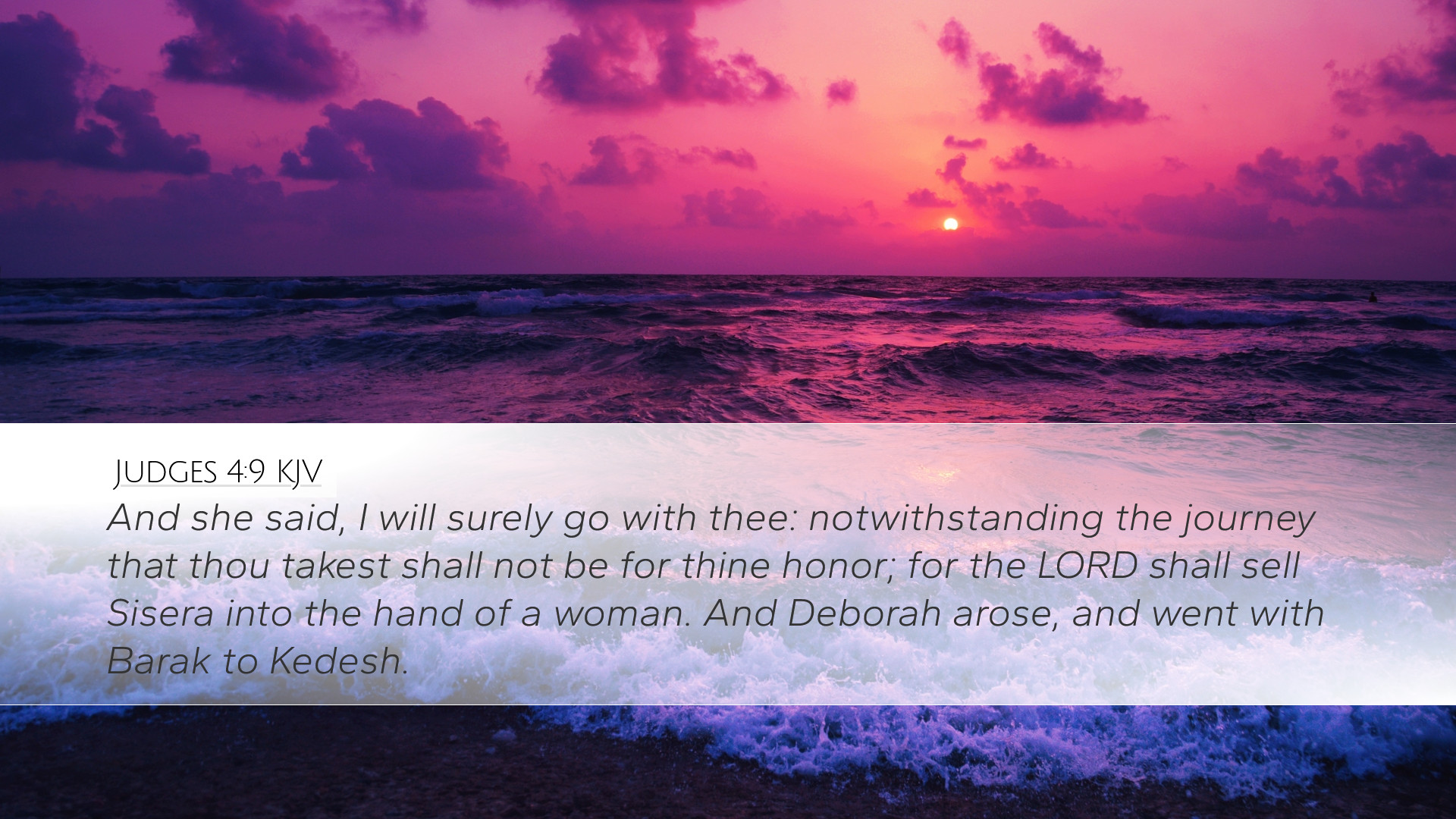Old Testament
Genesis Exodus Leviticus Numbers Deuteronomy Joshua Judges Ruth 1 Samuel 2 Samuel 1 Kings 2 Kings 1 Chronicles 2 Chronicles Ezra Nehemiah Esther Job Psalms Proverbs Ecclesiastes Song of Solomon Isaiah Jeremiah Lamentations Ezekiel Daniel Hosea Joel Amos Obadiah Jonah Micah Nahum Habakkuk Zephaniah Haggai Zechariah MalachiJudges 4:9
Judges 4:9 KJV
And she said, I will surely go with thee: notwithstanding the journey that thou takest shall not be for thine honor; for the LORD shall sell Sisera into the hand of a woman. And Deborah arose, and went with Barak to Kedesh.
Judges 4:9 Bible Commentary
Commentary on Judges 4:9
Judges 4:9 states: "And she said, I will surely go with thee: notwithstanding the journey that thou takest shall not be for thine honour; for the Lord shall sell Sisera into the hand of a woman." This verse is pivotal in the narrative of Deborah, Barak, and the defeat of Sisera, illustrating themes of female empowerment, divine providence, and the nature of honor in service to God.
Insights from Matthew Henry
Matthew Henry reflects on Deborah's role not only as a judge but also as a prophetess, emphasizing her unique position in Israel's history. He notes:
- Leadership of Deborah: Henry underscores that Deborah’s leadership breaks the mold of societal expectations, highlighting her courage and wisdom in directing Barak, a military leader.
- Divine Will: He points out that God often uses unexpected individuals to fulfill His plans, which is evident in Sisera's defeat by a woman, illustrating a reversal of traditional power dynamics.
- Message of Honor: Barak’s hesitance to go into battle without Deborah is seen as an act of courage, yet his name may not shine as brightly as the woman who ultimately plays a crucial role in the victory.
Insights from Albert Barnes
Albert Barnes provides a detailed examination of the text, shedding light on the implications of Deborah's statement:
- Conditional Cooperation: Barnes interprets Deborah’s agreement to accompany Barak as conditional upon recognizing that the battle would not result in personal glory for him. This reflects a significant biblical motif where God’s purposes supersede human ambition.
- Prophetic Fulfillment: He emphasizes that Deborah’s prophetic insight into Sisera's defeat represents divine intervention, where it is foretold that a woman will bring the enemy down. This serves to reinforce God’s sovereignty over human affairs.
- Shifts in Expectations: Barnes points out the likely shock this statement would have caused in a patriarchal society, presenting a strong commentary on the unpredictable ways God accomplishes His will.
Insights from Adam Clarke
Adam Clarke’s commentary digs deeper into the cultural and historical context of this narrative:
- Cultural Context: Clarke elaborates on the significance of a woman leading the charge against a formidable enemy like Sisera. He highlights the cultural implications of Deborah as a leader in a time when women had little agency.
- God’s Strength in Weakness: He echoes the notion that God's ways often confound the wise, as the victory over Sisera by a woman symbolizes the strength and support God gives to those who may seem weak or disadvantaged.
- Contrast of Honor: Clarke argues that true honor is placed in obedience to God rather than personal accolades. The suggestion that Barak would lose glory serves as a profound reminder of what it means to serve God faithfully, irrespective of worldly recognition.
Theological Implications
In synthesizing these insights, several theological implications emerge:
- Empowerment of Women in Scripture: This passage and its commentary highlight the important roles women hold in the biblical narrative, offering a corrective to gender biases that may overlook these contributions.
- Divine Sovereignty and Agency: The event underscores the belief in divine sovereignty where God orchestrates events beyond human understanding, utilizing any person, regardless of societal norms or expectations, to fulfill His will.
- Honor and Humility: The contrast between human desire for honor and God's approval challenges readers to examine their motivations in service. True greatness lies in selflessness and obedience to God's call, even when it leads to personal sacrifice.
Application for Today
For pastors, students, and scholars, the lessons from Judges 4:9 extend into contemporary applications:
- Encouragement in Leadership: Those called to leadership, particularly women, can draw encouragement from Deborah’s example, affirming God’s calling regardless of societal limitations.
- Understanding God’s Will: The text challenges believers to seek God’s guidance actively, understanding that His ways may lead them into paths that diminish their personal glory yet fulfill a divine purpose.
- Humility in Service: A reminder that success in God’s work does not equate to personal acclaim, encouraging a focus on serving God and His people with sincerity and humility.
Conclusion
Judges 4:9 serves as a compelling narrative that weaves together themes of empowerment, divine sovereignty, and the nature of true honor in serving God. Insights from profound biblical commentators enrich our understanding and application of this passage, encouraging further exploration of its implications in both historical and contemporary contexts.


